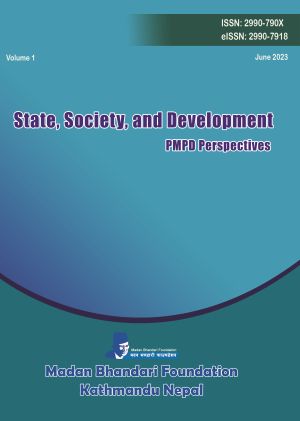Madan Bhandari and His Theory of People’s Multiparty Democracy
DOI:
https://doi.org/10.3126/ssd.v1i1.58470Keywords:
Process tracing, Nepali politics, Left movement, Political historyAbstract
People’s Multiparty Democracy (PMPD), postulated by Madan Kumar Bhandari in the early 1990s, is a political, economic, and social theory that combines Marxism with specific Nepali attributes. By reviewing the global landscape of socialist movements, Bhandari’s political thought offers a theoretical framework for critically examining Nepal’s evolving production relations based on its contemporary class dynamics. Tragically, Bhandari, who served as the Secretary-General of the Communist Party of Nepal-Unified Marxist Leninist (CPN [UML]), lost his life in a mysterious car accident in 1993. His political journey traces back to the 1960s when he began as a communist party worker during the Panchayat regime under the absolute monarchy. Subsequently, he drew inspiration from the postwar rise of communist parties around the world but went on to reshape Nepal’s unique left movement, setting it distinctly apart from other communist parties in South Asia and beyond. He recognized the need for a joint movement with non-communist groups like the Nepali Congress for the restoration of multiparty democracy, which remained vital in his ideological transformation. Applying a historical explanatory approach, this article explores the factors contributing to the formulation of PMPD while also retracing the evolution of Bhandari’s ideological position in the left movement with Nepali characteristics. Through an examination of the political history and Bhandari’s political philosophy, this article sheds light on the theory of PMPD, which has now become the guiding principle of CPN (UML).
Downloads
Downloads
Published
How to Cite
Issue
Section
License
Once published, an article in this Journal is not permitted to publish in other journals or similar publications without the permission of the Foundation. Contents and perspectives presented in the articles in the journal are solely of the authors.




